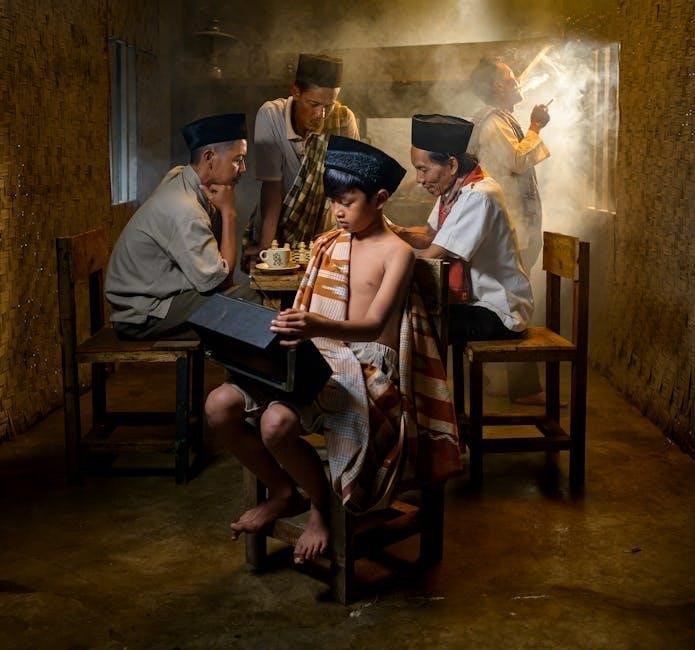Mockingjay, the final book in Suzanne Collins’ Hunger Games trilogy, published in 2010, follows Katniss Everdeen as the Mockingjay, symbol of rebellion, exploring war’s impact.
1.1 Overview of the Book
Mockingjay, the final book in Suzanne Collins’ trilogy, published in 2010, explores Katniss Everdeen’s transformation into the Mockingjay. It delves into themes of war, rebellion, and personal sacrifice, concluding her fight against the Capitol. The novel received widespread acclaim for its intense plot and emotional depth, solidifying its place as a young adult literature staple.
1.2 Author and Publication Details
Suzanne Collins is the renowned author of Mockingjay, published on August 24, 2010. Collins, known for her work in children’s television, transitioned to writing young adult fiction, crafting a trilogy that became a global phenomenon. Mockingjay was released to critical acclaim, selling over 400,000 copies in its first week and earning awards like the New York Times Notable Children’s Book of 2010.

Plot Summary of Mockingjay
Katniss Everdeen leads the rebellion against the Capitol in Mockingjay, confronting war’s horrors, personal losses, and political intrigue, culminating in a climactic showdown with President Snow.
Katniss Everdeen, the protagonist of Mockingjay, is a strong-willed survivor who becomes the face of the rebellion against the Capitol. Her journey from a humble hunter to a revolutionary leader highlights her resilience and internal struggles with the weight of responsibility and the cost of war.
2.2 The Rebellion Against the Capitol
The rebellion in Mockingjay escalates as Katniss becomes the Mockingjay, the symbolic face of the uprising. Districts unite against the Capitol’s oppression, seeking freedom and justice. The story highlights the harsh realities of war, sacrifice, and the moral dilemmas faced by those fighting for liberation, with Katniss at the forefront of the revolution.
2.3 Key Events and Climax
Mockingjay reaches its climax as Katniss leads the rebellion into the Capitol, facing intense battles and personal losses. The rescue of Peeta, brainwashed by the Capitol, and Katniss’s pivotal decision to kill President Coin instead of Snow mark the turning point. The epilogue shows Katniss and Peeta rebuilding their lives, highlighting the emotional and physical toll of war while offering a glimmer of hope.

Themes in Mockingjay
Mockingjay explores themes of war, survival, and rebellion, delving into the moral complexities of violence, the cost of leadership, and the psychological toll of conflict on individuals.
3.1 Loyalty and Trust
Loyalty and trust are central themes in Mockingjay, as Katniss grapples with her responsibilities to loved ones and the rebellion. Her bonds with Gale and Peeta are tested, while her role as the Mockingjay demands trust in allies, highlighting the fragility of relationships amid war and betrayal, and the sacrifices required for the greater cause.
3.2 Rebellion and Decision Making
Mockingjay explores Katniss’s role as the face of the rebellion, forcing her to make pivotal decisions that impact the war against the Capitol. Her transformation into a leader highlights the moral complexities of rebellion, as she balances personal motives with the greater good, revealing the weight of responsibility and the ethical dilemmas of leadership in a fractured world.
3.3 Betrayal and Violence
Mockingjay delves into the dark themes of betrayal and violence, as Katniss faces Peeta’s brainwashing and the brutal reality of war. The novel highlights the emotional toll of betrayal and the devastating consequences of violence, showcasing how both shape the characters and drive the plot toward its intense conclusion.
Suzanne Collins and Her Writing Style
Suzanne Collins, a former children’s TV writer, draws inspiration from her father’s military experiences, vividly portraying war’s impact in Mockingjay with emotional depth and realism.
4.1 Background of the Author
Suzanne Collins began her career writing for children’s television, including Nickelodeon shows like Clarissa Explains It All. Her father’s military background influenced her writing, particularly in depicting war’s effects. Before Mockingjay, she gained acclaim for The Hunger Games and Catching Fire, solidifying her reputation as a masterful storyteller in young adult literature.
4.2 Inspiration for the Hunger Games Series
Suzanne Collins drew inspiration from her father’s military experiences, Greek mythology, and reality TV. The Mockingjay symbolizes rebellion, reflecting themes of oppression, survival, and the exploitation of the poor by the wealthy; These influences shaped the series into a powerful commentary on war, humanity, and societal inequalities.
Availability of Mockingjay in PDF Format
Mockingjay is available in PDF format through authorized retailers and libraries. Legal downloads support the author and publishers, ensuring continued availability and maintaining its popularity.
5.1 Sources for Downloading the Book
Authorized platforms like hoopla, Blinkist, and major eBook retailers offer legal PDF downloads of Mockingjay. Ensure purchases are made through reputable sites to support the author and publishers, avoiding illegal downloads that infringe on copyrights and harm the literary community.
5.2 Legal Considerations for E-books
Downloading Mockingjay as an e-book requires adherence to copyright laws. Purchasing from authorized platforms ensures legality and supports the author. Piracy harms creators and violates intellectual property rights. Always opt for reputable sources like Amazon, Barnes & Noble, or Google Books to access the book legally and ethically.
Reception and Reviews
Mockingjay received widespread critical acclaim and commercial success, becoming a New York Times bestseller. Fans praised its emotional depth and thought-provoking themes, solidifying its place in young adult literature.
6.1 Critical Acclaim and Awards
Mockingjay earned widespread critical acclaim for its intense storytelling and thought-provoking themes. It became a New York Times bestseller and received awards like the USA Today Bestseller and Amazon Best Book of 2010. Suzanne Collins’ vivid portrayal of war’s consequences and Katniss’s emotional journey solidified its legacy as a landmark in young adult literature, resonating deeply with readers worldwide.
6.2 Fan Reactions and Impact
Mockingjay sparked intense fan reactions, with readers praising its emotional depth and bold conclusion. The book’s exploration of war’s consequences resonated deeply, igniting discussions worldwide. Fans admired Katniss’s growth and the story’s unflinching realism. The novel’s success helped cement The Hunger Games trilogy as a cultural phenomenon, inspiring countless fan art, theories, and community engagement, leaving a lasting impact on young adult literature.

Characters and Relationships
Mockingjay delve into complex relationships, with Katniss at the center, navigating bonds with Peeta, Gale, and Haymitch, while facing moral dilemmas and leadership challenges.
7.1 Katniss Everdeen’s Development
Katniss Everdeen evolves from a reluctant hero to a mature leader, grappling with the trauma of war, moral dilemmas, and the weight of rebellion. Her journey reveals internal conflicts between desire for peace and the necessity of violence, showcasing her growth into a symbol of hope and resilience, ultimately prioritizing survival and the future of Panem.
7.2 Peeta Mellark and His Role
Peeta Mellark, the baker’s son, plays a pivotal role as Katniss’s ally and emotional anchor. Captured and brainwashed by the Capitol, his manipulated statements undermine the rebellion. His loyalty and love for Katniss, despite trauma, highlight his resilience. Peeta’s journey from captive to survivor underscores his enduring support for Katniss and the symbolic role he plays in the rebellion’s propaganda and emotional landscape.
The Hunger Games Trilogy Context
The Hunger Games trilogy, concluding with Mockingjay, explores Panem’s oppressive regime and Katniss’s rebellion. Its success led to a new book, Sunrise on the Reaping, expanding the series’ legacy and impact.
8.1 Connection to Previous Books
Mockingjay seamlessly connects to The Hunger Games and Catching Fire, continuing Katniss’s journey as the Mockingjay symbol. The final installment escalates the rebellion, exploring her reluctant leadership and internal conflicts. Themes of war, sacrifice, and survival deepen, tying together the trilogy’s overarching narrative of oppression and resistance in Panem.
8.2 The Ballad of Songbirds and Snakes
The Ballad of Songbirds and Snakes, a prequel to the Hunger Games trilogy, explores the early days of Panem and the origins of the Hunger Games. It introduces young Coriolanus Snow, a future tyrant, and his complex relationship with a tribute, Lucy Gray Baird. This book deepens the understanding of the Capitol’s oppressive regime and its manipulation, setting the stage for the events of Mockingjay.

Literary Analysis and Symbolism
Mockingjay is rich in symbolism, with the Mockingjay itself representing defiance and the blending of reality and manipulation. Themes of war and survival are deeply explored.
9.1 The Mockingjay as a Symbol
The Mockingjay symbolizes rebellion and defiance, embodying Katniss’s dual role as a victim and a leader. It represents the blending of reality and manipulation, as Katniss becomes the face of the uprising. The Mockingjay’s origins as a failed genetic experiment mirror the Capitol’s unintended consequences, while its adoption by the rebels highlights the power of symbols in unifying resistance. Katniss’s internal struggle with this identity underscores the cost of war and leadership.
9.2 Themes of War and Survival
The novel vividly portrays the devastating consequences of war, emphasizing loss, trauma, and moral dilemmas. Katniss’s journey highlights the physical and emotional toll of survival in a war-torn world. The blurred lines between right and wrong underscore the complexity of conflict, while the resilience of characters like Katniss and Peeta illustrates the human spirit’s capacity to endure amidst chaos and destruction.
Mockingjay leaves a lasting impact as a powerful conclusion to the trilogy, solidifying its influence on young adult literature and culture. Suzanne Collins’ work continues to resonate globally, inspiring discussions on war, rebellion, and personal sacrifice, cementing its legacy as a modern literary phenomenon.
10.1 Impact on Young Adult Literature
Mockingjay redefined young adult literature by exploring complex themes like war, rebellion, and personal sacrifice. Its success inspired a wave of dystopian fiction, influencing authors to delve into darker, morally ambiguous narratives. The book’s raw emotional depth and thought-provoking storyline set a new standard for the genre, leaving a lasting influence on contemporary young adult storytelling.
10.2 Cultural Significance of Mockingjay
Mockingjay became a cultural phenomenon, sparking global discussions on rebellion, oppression, and personal sacrifice. Its exploration of war’s moral complexities resonated deeply, influencing popular culture and inspiring movie adaptations. The book’s themes of resistance and freedom continue to inspire societal conversations, cementing its legacy as a powerful commentary on humanity and governance.